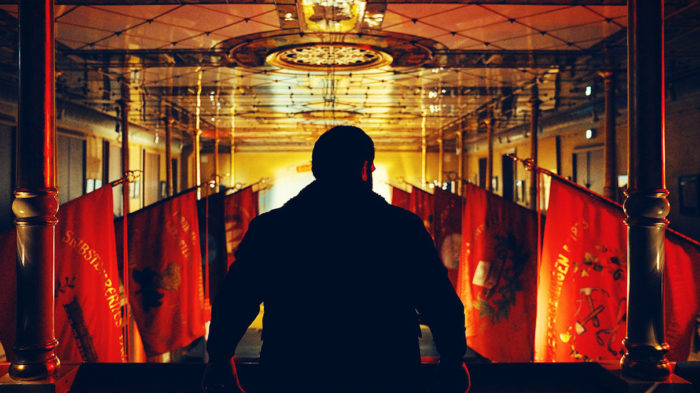
By Kristen Huizar
Denmark in recent years like many other European countries has had a growing diasporic population as a result of ongoing conflict and war in the Middle East. Unfortunately, there have been deadly clashes that has drawn a heated division. In 2015, a deadly shooting occurred as a result of ongoing tension from a controversial series of depictions of the prophet Muhammad by Swedish artist Lars Vilks. Since then, tensions between diasporic communities have risen as the Danish have become increasingly hostile toward them. By demonizing those who don’t learn the language and assimilate into Danish customs, working class refugees are sometimes relegated to ghettos (which is prime conditions for worsening xenophobia, racism and hate crimes). Xenophobia has even led its way into legislation that is eerily familiar to forced Native American assimilation. So, it is no surprise to the imagination that Danish director Ulaa Salim, whose parents are Iraqi, would create 2019’s Sons of Denmark/Danmarks sønner, which takes place in a dystopic 2025 Denmark.
The setting is Denmark, 2025 but the xenophobic rhetoric from rising politician Martin Nordahl (Rasmus Bjerg) sounds frighteningly familiar to the current state of politics and alarming rise of fascism. After a terror attack, the country’s dormant division catches fire and unleashes the rise of more vicious contentions between neo-Nazi groups and refugees. Zakaria (breakout star Mohammed Ismail Mohammed), a 19 year old trying to find belonging in a country that constantly rejects him, is caught in the crossfire while maintaining responsibility as head of the household. The catalyst for radicalization sparks when anti-immigrant hate messages are written on the walls of his apartment complex with pigs blood (the decapitated heads are left for all to see). This prompts Zakaria to become radicalized with a local group who is planning to assassinate the public face of the rising fascist movement, Martin Nordahl. Beneath a local cafe is their headquarters, where they house refugees who are in need of a community, home and escape from the rising attacks against them. Zakaria becomes close with Ali (Zaki Youssef), who takes Zakaria under his wing to prepare him for the attack. Ali stands in as a surrogate father for Zakaria who lost his father in Iraq, serving as a role model for his young and impressionable mind going under a life altering, ideological shift.
Simultaneously, Nordahl gains traction as he runs for office positioning himself as a family man and poster boy for a new Denmark. It’s as if Richard Spencer ran for president and charmed people with good looks all while continuing to unabashedly promote his fascist ideals (contrary to the disheveled current president). Nordahl is the fresh face for a turning point in politics, a rebranded fascism that is more palatable than a screaming businessman or seasoned politician. His ties to neo-nazi groups are glossed over repeatedly leaving the hands of police in a legal bind and inevitably drowned in blood.
The feeling of dread crawls into the bloodstream, Sons of Denmark is a raw portrait of our current world, riddled with a constant and overbearing sense of fear and terror. All across the Europe (and the rest of the world) right-wing leaders and groups have exploited and propagated fear against the waves of refugees who have escaped war torn countries. Fascism isn’t something stupid people disseminate or a product of irrational thought, it’s calculated, manufactured and packaged in a digestible way to target a majority white audience who need a scapegoat. It’s also incredibly dangerous when fascism is given a high platform where it’s tentacles seep into government and enact dangerous policies. From public figure heads to the role of police, fascism provides a cloak that obscures worsening problems under capitalism and instead pins the blame on a vulnerable target. From political leaders like Donald Trump or groups like the Danish People’s Party have utilized public fear of capitalism in decay and scapegoated it to whomever has a shred of empathy left for others in peril. Zakaria’s anger is rooted in reality, Nordahl’s rise to power is the result of mass denial and dismissiveness of the uncontrollable effect of unchecked and unchallenged fascism and national populism.
The community of refugees living in diaspora are harbored in a cultural limbo expected to assimilate and reject a part of their identity while their homeland is literally being torn apart by European and American militaries. The constant wars in the Middle East have done irreparable damage to refugees and their children who carry on the unfortunate legacy of unhealed trauma. The relationship between Ali and Zakaria illustrates the widening distance between generations who have integrated Danish culture in their lives and have almost completely neglected their roots. The second half of the film explores Ali’s identity closely and crescendos into an unforgettable and tragic climax.
Salim has painted a terrifying picture of the future as a wake up call to the present; it serves as bold commentary on current tensions in Denmark between white and diasporic populations but also on current state of the world. A world in which fascism has unfortunately gained traction and legitimacy in politics once again with no telling what the future holds if we choose to foolishly ignore it. Zakaria’s radicalization isn’t a product blind mob mentality but a response to a legitimate threat as a result of the neglectful and delusional government. The new fascistic wave of leaders like Nordahl aren’t a far cry from charismatic talking heads with glossy language to obscure their reprehensible disregard for humanity. Sons of Denmark is an incredibly disturbing film that hits incredibly close to home. Denmark is thousands of miles away from the US but is an uncanny vision of a plausible future. As tensions peak, fascism and national populism is handled as a product of irrationality rather than a credible threat that has seeped into the pores of the government.
Sons of Denmark is available to rent on Amazon Prime.

Kristen Huizar is an aspiring film critic and student based in Los Angeles. Follow her on Medium for more content.
For more reviews and discussion of film we recommend our highly popular “Top 10 Films on Women Fighting Capitalism and Fascism” and “Women in the Revolution: The Forgotten History of Las Sandinistas.”
